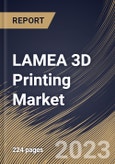The market has witnessed a remarkable evolution over the past few decades, transforming from niche technology to a phenomenon revolutionizing manufacturing and design across various industries. This groundbreaking technology, also known as additive manufacturing, has gained immense traction and reshapes how products are conceived, designed, and produced. This comprehensive exploration of the market will delve into its history, growth trajectory, industry applications, challenges, and future prospects.
In the past few years, the industry witnessed a surge in interest and investment, leading to the development of more sophisticated and affordable 3D printers. This accessibility democratized 3D printing, allowing businesses, researchers, and hobbyists to harness its potential. One of the significant characteristics of 3D printing (3DP) is its additive nature. It adds material to an object one layer at a time, in contrast to traditional subtractive manufacturing methods, which involve taking material away from a solid block to create a three-dimensional object. This layer-by-layer approach enables the creation of complex, intricate, and customized designs that were once inconceivable through conventional means.
The versatility of 3D printing has paved the way for its adoption across a diverse range of industries. From aerospace and automotive to healthcare and fashion, It has left its mark on virtually every sector. In aerospace, for instance, it has enabled the production of lightweight, high-performance components and reduced lead times in the manufacturing process. The automotive sector has used it for prototyping, customized parts, and even the production of entire vehicles. Healthcare has seen groundbreaking developments in creating patient-specific implants, prosthetics, and tissue and organ printing. This technology has also made waves in fashion and art, enabling designers to bring avant-garde creations to life.
Mexico is a major hub for the automotive industry, and it is making significant inroads in this sector. Automotive companies in Mexico are using it for prototyping, tooling, and even producing some end-use parts. The technology allows for rapid design iterations and cost-effective production of complex components. According to the International Trade Administration, Mexico is the seventh-largest producer of passenger cars worldwide, with an annual production of about three million vehicles. 76 percent of the cars made in this nation are exported, with the remainder going to the United States. With 14 manufacturers and assemblers of trucks, tractor trucks, buses, and engines, Mexico ranks sixth among countries producing heavy-duty commercial vehicles. These factors and the technology's ability to address a wide range of industrial needs position North America as a key hub for 3D printing advancements and applications.
The US market dominated the North America 3D Printing Market By Country in 2022, and would continue to be a dominant market till 2030; thereby, achieving a market value of $21,474.8 million by 2030. The Canada market is experiencing a CAGR of 23.3% during (2023 - 2030). Additionally, The Mexico market would exhibit a CAGR of 22.2% during (2023 - 2030).
Based on Component, the market is segmented into Product (Printer [Industrial and Desktop], Material [Polymer, Metal & Alloys, Ceramic and Others]), Software (Design Software, Inspection Software, Printer Software and Scanning Software), Services. Based on Technology, the market is segmented into Stereolithography, Fused Deposition Modeling, Selective Laser Sintering, Laminated object Manufacturing, Electron Beam Melting and Others. Based on Application, the market is segmented into Functional Parts, Fit & Assembly, Prototype Tooling, Metal Casting, Visual Aids, Presentation Modeling, Education/Research and Others. Based on Vertical, the market is segmented into Consumer Goods, Construction, Education, Industrial, Healthcare, Aerospace & Defense, Automotive and Others. Based on countries, the market is segmented into U.S., Mexico, Canada, and Rest of North America.
The market research report covers the analysis of key stakeholders of the market. Key companies profiled in the report include Hoganas AB, 3D Systems Corporation, Materialise NV, General Electric Company, Stratasys Ltd., Autodesk, Inc., The ExOne company (Desktop Metal, Inc.), Organovo Holdings, Inc., voxeljet AG and Canon, Inc.
Scope of the Study
Market Segments Covered in the Report:
By Component- Product
- Printer
- Industrial
- Desktop
- Material
- Polymer
- Metal & Alloys
- Ceramic
- Others
- Software
- Design Software
- Inspection Software
- Printer Software
- Scanning Software
- Services
- Stereolithography
- Fused Deposition Modeling
- Selective Laser Sintering
- Laminated object Manufacturing
- Electron Beam Melting
- Others
- Functional Parts
- Fit & Assembly
- Prototype Tooling
- Metal Casting
- Visual Aids
- Presentation Modeling
- Education/Research
- Others
- Consumer Goods
- Construction
- Education
- Industrial
- Healthcare
- Aerospace & Defense
- Automotive
- Others
- US
- Canada
- Mexico
- Rest of North America
Key Market Players
List of Companies Profiled in the Report:
- Hoganas AB
- 3D Systems Corporation
- Materialise NV
- General Electric Company
- Stratasys Ltd.
- Autodesk, Inc.
- The ExOne company (Desktop Metal, Inc.)
- Organovo Holdings, Inc.
- voxeljet AG
- Canon, Inc.
Unique Offerings
- Exhaustive coverage
- The highest number of Market tables and figures
- Subscription-based model available
- Guaranteed best price
- Assured post sales research support with 10% customization free
Table of Contents
Companies Mentioned
- Hoganas AB
- 3D Systems Corporation
- Materialise NV
- General Electric Company
- Stratasys Ltd.
- Autodesk, Inc.
- The ExOne company (Desktop Metal, Inc.)
- Organovo Holdings, Inc.
- voxeljet AG
- Canon, Inc.



![3D Printing Market by Offering (Printers, Materials, Software, Services), Technology [Fused Deposition Modeling (FDM), Stereolithography (SLA), Selective Laser Sintering (SLS)], Process, Application, Vertical - Global Forecast to 2030 - Product Image](http://www.researchandmarkets.com/product_images/12731/12731683_60px_jpg/3d_printing_market.jpg)




